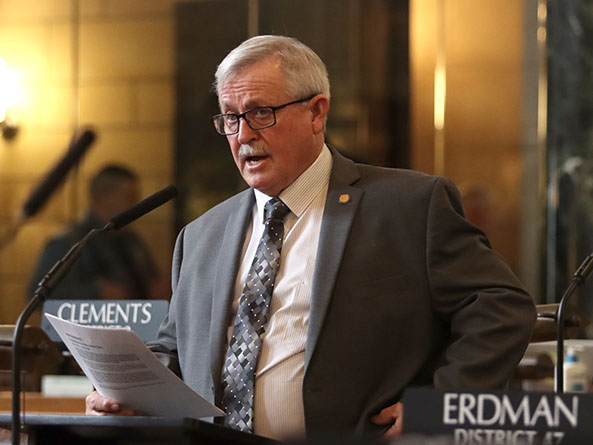Senators adopt new session rules
After considering several changes, lawmakers adopted their permanent rules Jan. 19. The rules of the Legislature govern the legislative process and are adopted at the beginning of each biennium.
Of the nearly 60 proposed changes heard in last week’s public hearing, only seven changes — mostly technical in nature — were brought forward by the Rules Committee for debate. A proposal to require public votes for election of the speaker and chairpersons of the Legislature’s 14 standing committees was not among them.
Committee chairperson, Sen. Steve Erdman of Bayard, said the package consisted of the proposals that the committee believed could be “most readily accepted” by lawmakers. This approach would allow the session to move forward rather than being bogged down in an extended rules debate, he said.
At the start of the 2017 session, it took lawmakers roughly two months to reach agreement on the permanent rules.
One element of this year’s package, originally brought to the committee by Lincoln Sen. Danielle Conrad, requires that the Rules Committee provide public notice of proposed rules changes at least three calendar days prior to conducting a public hearing.
Conrad said the large number of people who showed up for the Rules Committee hearing was evidence that Nebraskans care about the Legislature’s processes and want to be involved. The existing rules ensure that every bill introduced is subject to a transparent process and informed public input, she said, and the new notice requirement will bring the Rules Committee in line with that framework.
“I think [the rules hearing] was an incredible learning opportunity,” Conrad said. “I think that there were a host of really interesting and important ideas brought forward by senators and by our citizenry.”
The proposal was adopted 47-0.
Also approved was a change that impacts the speaking order after a motion to kill a bill — referred to as a motion to indefinitely postpone, or IPP — is made prior to general file debate. Under existing rules, the introducer of the IPP is allowed to open on their motion prior to the bill sponsor being allowed to introduce the measure when it first comes up for consideration on general file.
The committee change switches that order, allowing the bill introducer to speak first followed by the introducer of the IPP motion.
Erdman said the original version of the proposal, brought to the Rules Committee by Sumner Sen. Teresa Ibach, would have prohibited a senator from filing an IPP motion prior to general file debate. Instead, he said, the committee chose to offer a compromise as a “step in the right direction” toward changing a rule that Erdman said can damage the ability of senators to work together.
“I used this [option] once,” he said. “Never, ever will I use it again. This body, and what we do here, is built on relationships. And the one time that I [offered] an IPP motion before a bill was read across — it took a long time to restore the relationship that I had with that senator.”
Speaker John Arch of La Vista supported the proposal, calling it a matter of decorum to allow a bill introducer to speak first during debate on their proposal. Opponents still can try to kill a bill, he said, noting that the change alters only the order in which the IPP motion is considered.
“It’s an issue of fairness,” Arch said. “It’s an issue of courtesy.”
Omaha Sen. Machaela Cavanaugh opposed the change. She offered and later withdrew a motion to recommit the proposal to the Rules Committee, saying the ability to control who speaks first on a bill can be an important strategic tool that allows senators to set the stage for debate.
The rules change was approved on a vote of 46-2.
Cavanaugh then offered a proposed change that she also presented at the Rules Committee public hearing, which would prohibit individuals except law enforcement and military personnel from carrying a deadly weapon in the Capitol during legislative proceedings.
Currently, concealed carry is prohibited in the Capitol, but open carry is allowed.
Cavanaugh, who introduced a bill this year that would have the same effect, said the change would not be an “unreasonable burden” on the exercise of Second Amendment rights. Many locations, including schools and many government buildings, do not allow open carry under existing state law, she said.
“This is not taking away anyone’s rights,” Cavanaugh said. “It is a choice to come to the Capitol, just like it is a choice to go to any other public place where guns are prohibited.”
Kearney Sen. John Lowe opposed the change, calling it an “overstep” that threatens Second Amendment rights. Anything from a comb to a pen could be used as a “deadly weapon,” he said, arguing that the language of the proposal also was too broad.
The proposal was defeated on a vote of 7-32.
A third technical proposal offered by Cavanaugh was defeated 8-33.
Lawmakers approved a change put forward by Omaha Sen. Mike McDonnell, which establishes procedures for active or reserve members of the military to lead the Legislature in the daily Pledge of Allegiance. Currently, senators may invite clergy members to offer the opening prayer at the start of each legislative day, and the proposal, adopted 44-0, mirrors that system.
Following adoption of the McDonnell proposal and five additional technical changes, senators voted 44-0 to adopt the permanent rules.


